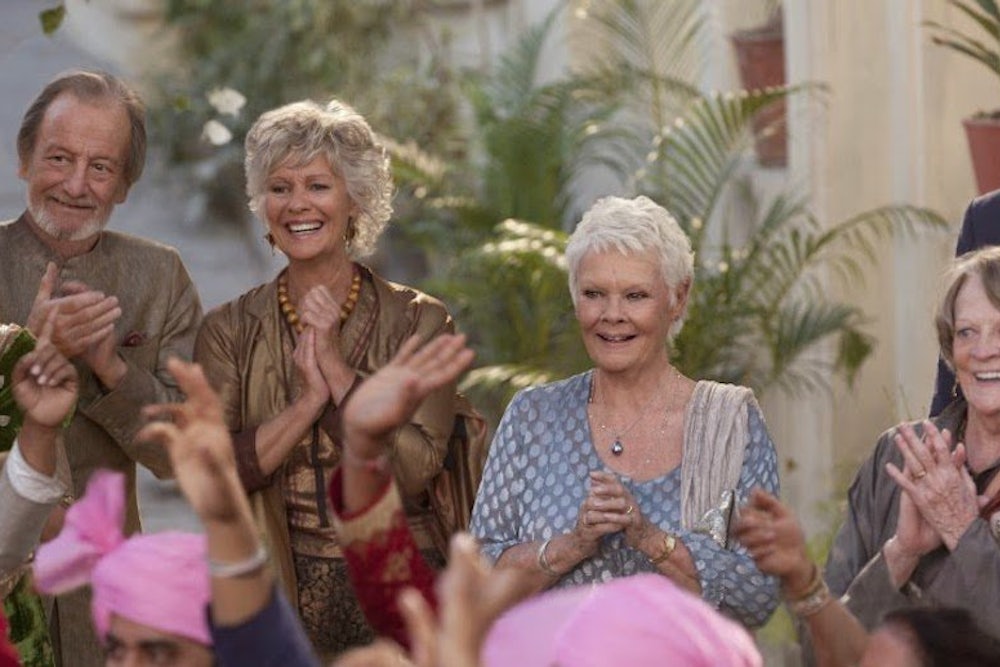It’s a Hollywood cliché: Pass age 40 (or 30 or 25), and your options as an actress disappear. But that may be changing, with the rise of a subgenre of movies starring older actors geared toward older audiences. Most recently, there’s The Second Best Exotic Marigold Hotel, the uncreatively named sequel to 2011’s surprise hit about a group of Brits who “outsource” their retirement to India. The film features a lineup that reads like a who’s who of British acting elder statesmen (and women): Judi Dench, Maggie Smith, Bill Nighy, Penelope Wilton, Celia Imrie.
And films like Marigold are successful. After one weekend, the sequel has already made $8.5 million to add to the first installment’s $46.4 million domestic gross—almost five times its production budget. They’re part of a growing cottage industry of movies built around older stars—many of them British. There’s been Maggie Smith’s Quartet (2012), also set at a retirement home, which managed to reel in $18.4 million; Helen Mirren’s The Hundred-Foot Journey (2014) did even better, bringing in $54.2 million. Philomena (2013), starring Judi Dench, crowned its $38 million American gross with four Oscar nominations. Going back to 2003, when such movies were much more rare, Mirren’s Calendar Girls made $31 million.
The growing appeal of these films derives from a few factors: the increasing popularity of indie cinema and the much-heralded golden age of television, both of which create more opportunities for older actors. The aging of the baby boomers may be a factor, too; as the audience ages, it’s natural that movies age too.
But the real reason that so many older actors and actresses are gracing screens big and small may be located across the pond. When the Harry Potter franchise first lit up the screen in 2001, it marshaled a fleet of British actors of a certain vintage: Maggie Smith, Alan Rickman, Bill Nighy, Robbie Coltrane, Richard Griffiths, Miranda Richardson, Gary Oldman, Emma Thompson, Julie Walters—to name a few. If you were a respected British actor looking for work, Hogwarts was the place to be. Harry Potter made these British thespians instantly recognizable. It also acted as a later-in-life springboard to high-profile roles: Gary Oldman went on to star in Christopher Nolan’s Batman trilogy; Alan Rickman was cast in Snape-like roles such as the Judge in Sweeney Todd; Maggie Smith became the Dowager Countess of “Downton Abbey.” It even spawned Internet memes such as CollegeHumor’s “These 12 British Actors Are In Everything You Love” or Buzzfeed’s similar “57 British Actors Every Geek Will Recognize.”
It’s no coincidence these stars are British. It’s not that Brits age better than Americans, or even that the accent lends them more gravitas; it’s that the British entertainment industry is structured in a way that helps their careers to keep going, even after the wrinkles set in. “The American actor strives for celebrity; the British actor strives for authenticity,” Paul Booth, a DePaul University professor who studies popular culture, told me. That’s not to say that Brits are necessarily more talented than Americans, but they are believed to be more focused on acting as an artform, a trait that doesn’t fade with age.
The British also train to be more versatile, regularly performing in movies, television, radio, and theater, which gives them more room to maneuver as they grow older. That also means that there are more roles for older actors—for a smaller pool of people than in ultra-competitive Hollywood. In the U.K., older actors who find plum movie roles hard to come by can turn to the stage, where many Shakespeare and Chekhov productions welcome them. British television, where older leads are a common sight, also provides a source of employment.
That’s not to say that Hollywood doesn’t have its own share of elderly actors who have successfully continued their careers after their peers have entered retirement. Jack Nicholson received an Oscar nomination for his performance in About Schmidt (2002), as did Bruce Dern for Nebraska (2013). Last year, Love is Strange, starring Alfred Molina and John Lithgow as an older gay couple, was an indie hit. But in recent years many of Hollywood’s attempts to muscle into this lucrative subgenre have fallen short, with movies like Red (2010), about a group of retired secret agents forced back into action; and Last Vegas (2013). While successful at the box office, these movies lack a key ingredient that makes their British counterparts so appealing. They are entirely based on the comedic value of watching older people engage in outlandishly unexpected activities like action-hero stunts and bachelor-party shenanigans.
There is some of this in the Marigold films. In the first Marigold Hotel, Norman (Ronald Pickup), the resident womanizer, is warned about the dangers of having sex at his age. “If she dies, she dies,” he replies with wicked determination. Dame Judi Dench downs gin and tonics, gets a job for the first time, and struggles to define her relationship with Bill Nighy—activities that feel more millennial than geriatric. But for all its zingy one-liners and slapstick situations, the film deals with real issues—the loss of a spouse, the emotional rollercoaster of a bad marriage, racism, coming out at long last, and the grief of losing a lifelong friend. These movies are funny and fantastical, but also grounded in the belief that the lives of elderly, and the issues they face, are just as valuable and interesting as the stories of the young. In a culture that valorizes youth, these depictions play a valuable role in diversifying our cultural landscape.
